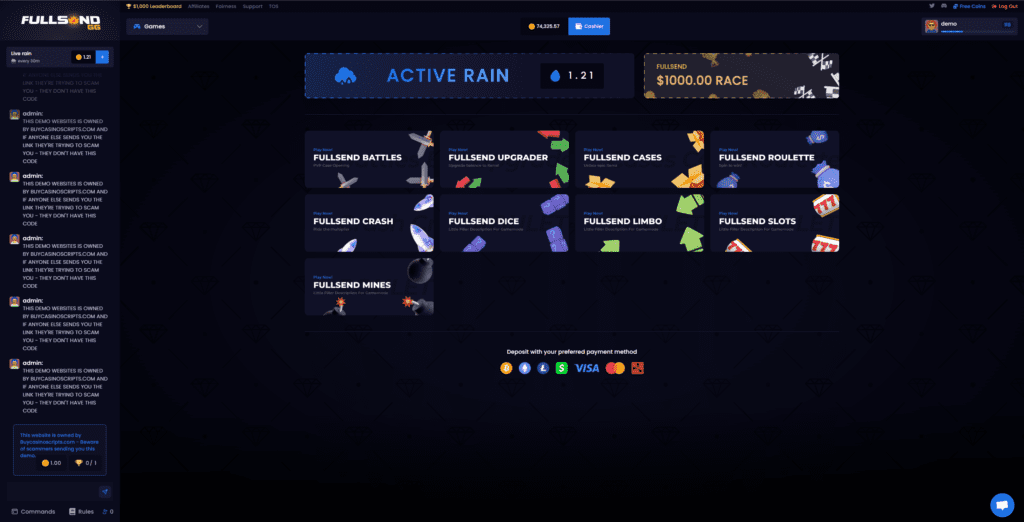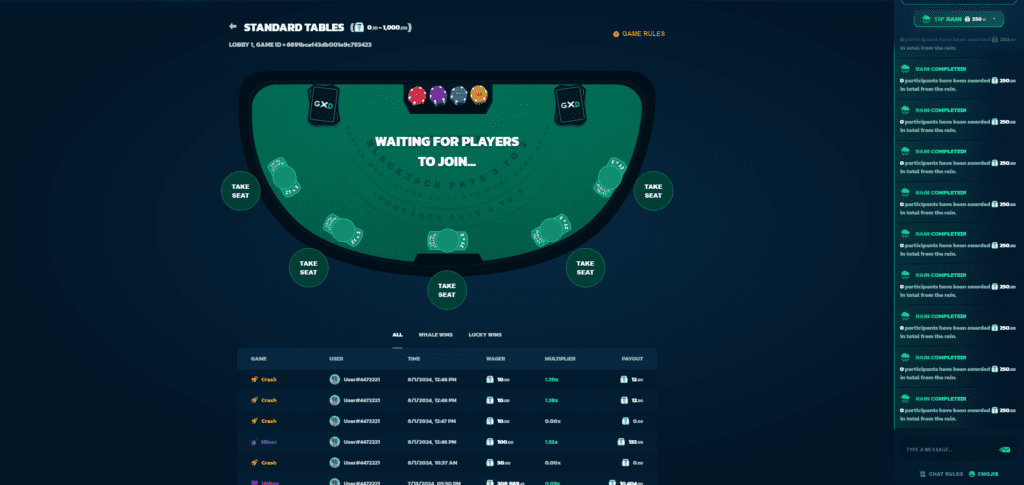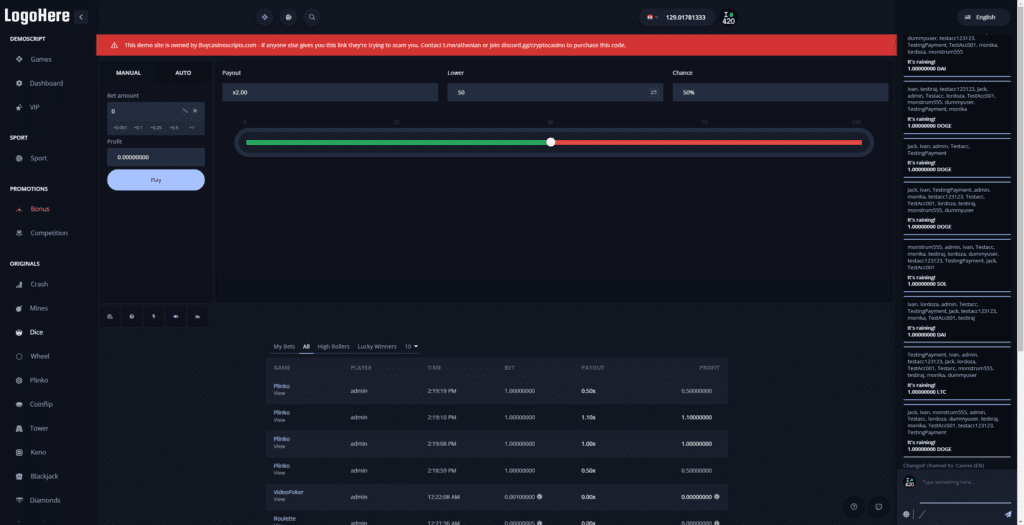Using Premade Casino Software in 2024: A Guide to Integrating Crypto Casino Source Code
Introduction to Premade Casino Software
Evolution of iGaming Industry
The iGaming industry has undergone a significant transformation since its inception. From the early days of basic online poker and slots to the highly sophisticated and immersive gaming platforms of today, the evolution has been marked by technological advancements, changing user preferences, and regulatory shifts. The early 2000s saw the birth of online gambling, where rudimentary software and limited internet capabilities restricted the experience. As technology progressed, so did the quality and variety of games, with the introduction of live dealer games, mobile gaming, and VR casinos.
In recent years, the industry has embraced blockchain technology, leading to the rise of cryptocurrency casinos. These platforms offer players enhanced security, transparency, and speed of transactions, addressing some of the major concerns with traditional online casinos. As we move into 2024, the integration of advanced technologies like artificial intelligence and machine learning is set to further revolutionize the industry, offering more personalized and secure gaming experiences.
Advantages of Using Premade Casino Software
Opting for premade casino software presents several advantages for operators looking to enter the iGaming market or upgrade their existing platforms. Firstly, it significantly reduces development time and costs. Building a casino platform from scratch requires substantial investment in both time and money, including hiring skilled developers, designers, and compliance experts. Premade solutions, on the other hand, come with pre-built features and functionalities, enabling faster deployment and lower costs.
Secondly, premade software often includes comprehensive support and maintenance services. This means that operators can rely on the software provider for updates, bug fixes, and technical support, ensuring a smooth and uninterrupted gaming experience for players. Additionally, these solutions are usually designed with scalability in mind, allowing operators to easily expand their offerings as their business grows.
Lastly, premade casino software providers have extensive experience in the industry and understand the regulatory requirements. This expertise ensures that the software is compliant with various jurisdictions, helping operators avoid legal issues and ensuring a trustworthy platform for players.

Overview of Crypto Casino Source Code
Crypto casino source code is the backbone of a cryptocurrency-based gambling platform. This code integrates blockchain technology to manage transactions, user accounts, and game outcomes, ensuring transparency and security. The core components of this source code include smart contracts, which automate processes and enforce rules without the need for intermediaries, and cryptocurrency wallets, which facilitate seamless deposits and withdrawals.
Using crypto casino source code offers several benefits. It enhances security by leveraging blockchain’s immutable ledger, which records all transactions and game outcomes in a tamper-proof manner. This transparency builds trust among players, as they can verify the fairness of games independently. Moreover, cryptocurrency transactions are faster and often cheaper compared to traditional banking methods, providing a more efficient gaming experience.
As the demand for cryptocurrency casinos continues to grow, integrating crypto casino source code has become a vital consideration for operators looking to stay competitive in the market.
Trends in 2024
The iGaming industry in 2024 is poised to embrace several key trends. Firstly, the integration of artificial intelligence (AI) and machine learning will enhance player personalization, offering tailored gaming experiences and improved customer support through AI chatbots. Secondly, the adoption of virtual reality (VR) and augmented reality (AR) technologies will create more immersive and engaging gaming environments, attracting a broader audience. Lastly, the continued rise of cryptocurrency casinos will drive innovation in payment methods, security measures, and game fairness, setting new standards for the industry.
Integrating Crypto Casino Source Code
Understanding Blockchain Integration
Integrating blockchain technology into an online casino platform involves several critical steps. Blockchain integration starts with understanding the basic components: decentralized ledgers, smart contracts, and consensus mechanisms. A decentralized ledger ensures that all transactions and game outcomes are recorded transparently and immutably across a network of computers. This eliminates the risk of tampering and fraud, as no single entity has control over the entire ledger.
Smart contracts play a crucial role in automating and enforcing the rules of the casino. These self-executing contracts with the terms of the agreement directly written into code ensure that payouts, game outcomes, and other processes are handled automatically and fairly. For example, a smart contract can automatically transfer winnings to a player’s cryptocurrency wallet once a game is completed, eliminating the need for manual intervention.
The consensus mechanism, which could be Proof of Work (PoW) or Proof of Stake (PoS), ensures that all participants in the network agree on the validity of transactions. This consensus is vital for maintaining the integrity and security of the blockchain.
To integrate blockchain into a casino platform, developers need to choose the appropriate blockchain network, such as Ethereum or Binance Smart Chain, based on factors like transaction speed, cost, and scalability. They then develop and deploy smart contracts tailored to the casino’s needs, ensuring that all gaming operations are transparent, secure, and automated.

Choosing the Right Crypto Casino Source Code
Selecting the right crypto casino source code is critical for the success of a cryptocurrency-based gambling platform. Operators should consider several factors when making this choice. First, the source code should be well-documented and come from a reputable provider. This ensures that the code is reliable, secure, and compliant with industry standards.
Second, the source code should offer flexibility and customization options. This allows operators to tailor the platform to their specific needs, including branding, game selection, and user interface. A customizable source code enables the addition of unique features that can differentiate the casino from competitors.
Lastly, it’s essential to evaluate the level of support and maintenance provided by the source code provider. Continuous updates, security patches, and technical support are crucial for the smooth operation of the casino. Operators should choose a provider with a proven track record of excellent customer service and ongoing development.
Development and Customization
Once the appropriate crypto casino source code is selected, the development and customization phase begins. This process involves several steps, starting with setting up the development environment and integrating the source code with the chosen blockchain network. Developers then customize the platform’s front-end and back-end according to the operator’s requirements.
Customization includes designing the user interface to match the casino’s branding, adding or modifying games, and integrating payment gateways to support various cryptocurrencies. Additionally, developers implement security features to protect user data and transactions, such as two-factor authentication and encryption.
Testing is a crucial part of this phase. Rigorous testing ensures that all components of the platform work seamlessly, from game mechanics to transaction processing. Once testing is complete, the platform is ready for deployment. Ongoing maintenance and updates are necessary to keep the platform secure and up-to-date with the latest technological advancements.
Compliance and Regulatory Considerations
Operating an online casino, particularly one that deals with cryptocurrencies, requires strict adherence to regulatory standards. Compliance with these regulations ensures the legitimacy and legality of the platform, building trust with players and avoiding legal repercussions.
Each jurisdiction has its own set of regulations governing online gambling and cryptocurrency use. Operators must obtain the necessary licenses from relevant authorities, such as the Malta Gaming Authority (MGA), the UK Gambling Commission, or the Curacao eGaming Licensing Authority. These licenses demonstrate that the casino adheres to industry standards and regulations, providing a secure and fair gaming environment for players.
In addition to obtaining licenses, operators must implement robust Know Your Customer (KYC) and Anti-Money Laundering (AML) procedures. KYC involves verifying the identity of players to prevent fraud and underage gambling, while AML procedures are designed to detect and prevent money laundering activities. These measures are critical for maintaining the integrity of the platform and complying with legal requirements.
Regular audits and compliance checks are also necessary to ensure ongoing adherence to regulatory standards. These audits, often conducted by third-party organizations, evaluate the casino’s operations, security measures, and financial transactions, providing assurance to players and regulators alike.

Security Measures for Cryptocurrency Transactions
Security is a top priority for any online casino, especially those dealing with cryptocurrency transactions. Implementing robust security measures protects the platform from cyber threats and ensures the safety of players’ funds and data.
Firstly, the use of secure encryption protocols is essential. End-to-end encryption safeguards all data transmitted between the player and the casino, preventing unauthorized access and tampering. SSL certificates should be implemented to establish a secure connection and protect sensitive information such as personal details and payment credentials.
Secondly, multi-factor authentication (MFA) adds an extra layer of security. By requiring players to provide multiple forms of verification, such as a password and a one-time code sent to their mobile device, MFA reduces the risk of unauthorized access to accounts.
Thirdly, cold storage solutions should be used for cryptocurrency funds. Unlike hot wallets, which are connected to the internet and vulnerable to hacking, cold wallets store funds offline, providing a higher level of security. Regular security audits and penetration testing help identify and address vulnerabilities in the platform, ensuring that security measures remain effective against evolving threats.
Lastly, educating players about security best practices, such as using strong passwords and being cautious of phishing attempts, further enhances the overall security of the platform.
The Future of iGaming: Innovations and Opportunities
The iGaming industry is set to experience continued growth and innovation in the coming years. Several key areas are likely to shape the future of online gambling.
Firstly, the integration of artificial intelligence (AI) will revolutionize the industry. AI-powered algorithms can analyze player behavior and preferences, offering personalized game recommendations and marketing strategies. AI chatbots can provide instant customer support, enhancing the overall player experience.
Secondly, the adoption of virtual reality (VR) and augmented reality (AR) technologies will create more immersive and engaging gaming environments. Players will be able to experience the thrill of a real casino from the comfort of their homes, interacting with dealers and other players in a virtual setting.
Thirdly, the continued rise of cryptocurrency casinos will drive innovation in payment methods and security measures. As more players adopt cryptocurrencies, casinos will need to offer a wider range of supported coins and tokens, as well as enhanced security features to protect transactions.
Lastly, regulatory advancements will play a crucial role in shaping the future of iGaming. As governments around the world develop clearer guidelines for online gambling and cryptocurrency use, operators will have more opportunities to expand their offerings and reach new markets.
Conclusion
The use of premade casino software and the integration of crypto casino source code offer significant advantages for operators in the rapidly evolving iGaming industry. By leveraging blockchain technology, operators can provide a secure, transparent, and efficient gaming experience for players. As the industry continues to innovate and grow, staying ahead of trends and regulatory requirements will be essential for success. With the right strategies and technologies in place, operators can capitalize on the opportunities presented by the dynamic and exciting world of online gambling.

